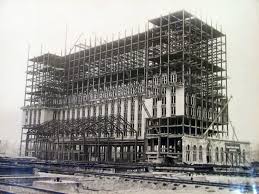The news article I read this week was titled “The Problem with Rebuilding Detroit” written by David Uberti. The piece discusses the sale of Michigan Central Station to Ford Motor Company and the controversy surrounding what this means for the neighborhood and its current residents. I chose to read this article because I feel as though I have heard about the development in Detroit in a largely positive light. While I always heard brief mentions of opposition, I did not truly understand that controversy and felt as though this article was a good way to further explore it.
After reading the article, I had very mixed feelings. Both arguments made a lot of sense. On one hand, building the downtown center would create new jobs and transform a decade old symbol of decline into one of resurgence. However, on the other it had the potential to drive previous residents out, raise rents, and change the culture of the community.
I went to work today with the same mixed feelings until my boss tapped on Chris and I’s shoulders and asked “Do you want to do something fun today?”. We of course said yes, and she proceeded to drive around Detroit and through the neighborhoods TechTown serves. She explained more of the city’s history and the efforts to revive it. I thought that I understood the issues Detroit faces are complicated. However, the more she talked the more I learned that the problems the city deals with are much more complex than I had previously imagined. This effects the efforts to rebuild and makes decisions on how to best help the city difficult. After learning more about neighborhood development in Detroit, I now view the train station purchase more favorably. Rebuilding a city is a complex process, and any move you make has the potential to inflict negative consequences. However, it is clear to me that in order to revitalize an area you need to add what the community is missing. TechTown does this by seeing what businesses and services a community needs access to. The train station could do this for Corktown by providing the community with a symbol of hope and a new source of income. Gentrification is a very real and very problematic. However, I think June Mannings, a University of Michigan professor quoted in the article, had a valid point when she stated the “uglier side of gentrification has thus far been minimized” because “most of the downtown development didn’t involve displacement because no one was really living there.” Although the vacancy found in Detroit’s neighborhoods lessens the negative impact of gentrification, efforts clearly still need to be made to thoughtfully construct this development and input needs to be received from the current community. Hopefully, Ford Motor Company, a business with a long history intertwined with this city, will make a conscious effort to do so.
Link to Article: https://www.huffingtonpost.com/entry/problem-with-rebuilding-detroit-michigan-ford-gentrification-cities_us_5ae31cffe4b02baed1b991c9
After reading the article, I had very mixed feelings. Both arguments made a lot of sense. On one hand, building the downtown center would create new jobs and transform a decade old symbol of decline into one of resurgence. However, on the other it had the potential to drive previous residents out, raise rents, and change the culture of the community.
I went to work today with the same mixed feelings until my boss tapped on Chris and I’s shoulders and asked “Do you want to do something fun today?”. We of course said yes, and she proceeded to drive around Detroit and through the neighborhoods TechTown serves. She explained more of the city’s history and the efforts to revive it. I thought that I understood the issues Detroit faces are complicated. However, the more she talked the more I learned that the problems the city deals with are much more complex than I had previously imagined. This effects the efforts to rebuild and makes decisions on how to best help the city difficult. After learning more about neighborhood development in Detroit, I now view the train station purchase more favorably. Rebuilding a city is a complex process, and any move you make has the potential to inflict negative consequences. However, it is clear to me that in order to revitalize an area you need to add what the community is missing. TechTown does this by seeing what businesses and services a community needs access to. The train station could do this for Corktown by providing the community with a symbol of hope and a new source of income. Gentrification is a very real and very problematic. However, I think June Mannings, a University of Michigan professor quoted in the article, had a valid point when she stated the “uglier side of gentrification has thus far been minimized” because “most of the downtown development didn’t involve displacement because no one was really living there.” Although the vacancy found in Detroit’s neighborhoods lessens the negative impact of gentrification, efforts clearly still need to be made to thoughtfully construct this development and input needs to be received from the current community. Hopefully, Ford Motor Company, a business with a long history intertwined with this city, will make a conscious effort to do so.
Link to Article: https://www.huffingtonpost.com/entry/problem-with-rebuilding-detroit-michigan-ford-gentrification-cities_us_5ae31cffe4b02baed1b991c9

 RSS Feed
RSS Feed
